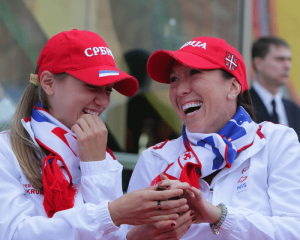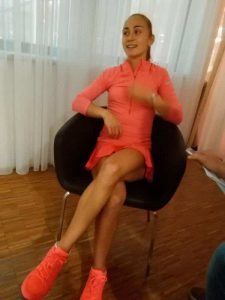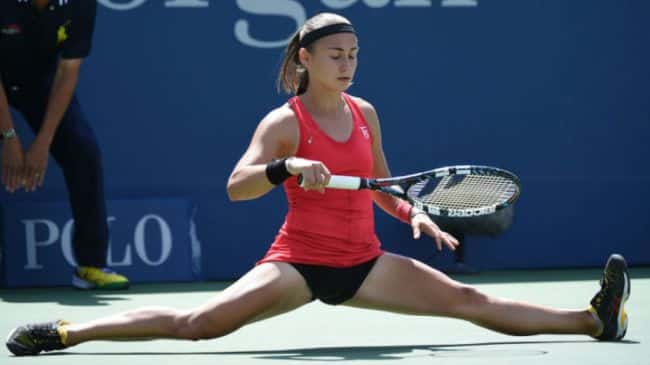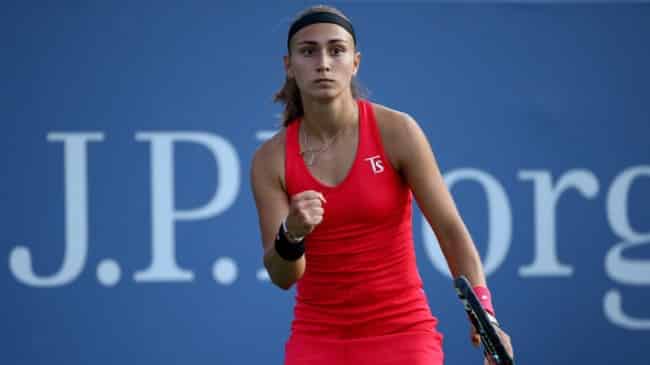by Giulio Gasparin (@GiulioGasparin) and Michele Galoppini (@MikGaloppini)
Aleksandra Krunic is a character and a player that cannot pass unnoticed: if you happened to watch her on court she’s a concentrate of emotions, skills and athleticism. She can defend what most people would believe impossible to catch, crack unexpected winners and surprise you with good hands, slices, volleys and drops. Off the court she is reflexive but extrovert, she likes a good talk and be it on the subject of psychology, airplanes or the weather, she always has an opinion on things that will make her talk worth to be listened.
Her story is also one of a kind: she was born and raised in Moscow, where she admits to still feel like home, but her Serbian parents had her keeping the Serbian citizenships. This fact created a personal fight within herself between her roots and her present, but today she feels more Serbian than ever, yet without denying her special bond with Russia. For that I am sure that she will be watching this weekend’s FedCup final cheering for the team she wanted to be part of in her childhood.
Let’s start with a fact: this year you played some “hot shots” with tweeners, dropshots and crazy volleys, it seems like you enjoy doing that on court!
Well yeah… yeah! I like volleying best and I was playing volleys during my entire career so it’s something I really feel good with. It’s better than another dropshot to make, for me for sure (smile).
As you said, you have a very all round game. Can you tell us how it all started? I know you started playing tennis in Russia, then you moved to Slovakia… but maybe you can tell us more about it.
Yeah, I started in Moscow, I worked there with my first coach for 10 years, but then at some point he couldn’t travel anymore so I had to think something. I went to Slovakia and I’ve stayed there for a year, or a bit more. Then I was trying to find my way in Serbia, because there are not many coaches there, so I was going from one coach to another and then I started working with Biljana [Veselinovic] and I’m still working with her. I first was sharing her with Alizé Cornet, but they stop doing it in Wimbledon and now I’m working alone with her. I have a Serbian team now, which is really the best… our mentality is not the same of others’, maybe you know, for example we are really hot-blooded (smile). I feel at best right now, now I’m at home.
I know you have a pretty good relationship with Jelena Jankovic, she helps you a lot. Do you want to tell us more about it?
 She was supporting me throughout my career, let’s say since I’m 15 or 16, since I played the FedCup and she played many doubles with me. She helped me also in practices and she is always ready to practice with me. I respect her as a player and first of all as a person. She is very open and I know when she likes something or when she doesn’t like something about me, so she is clear with me and I like this way of communication. I like being clear with someone. So she is definitely very supportive and a very open person.
She was supporting me throughout my career, let’s say since I’m 15 or 16, since I played the FedCup and she played many doubles with me. She helped me also in practices and she is always ready to practice with me. I respect her as a player and first of all as a person. She is very open and I know when she likes something or when she doesn’t like something about me, so she is clear with me and I like this way of communication. I like being clear with someone. So she is definitely very supportive and a very open person.
I also know you have a nice relationship with Timea Bacsinszky, that you are very close to her, that you talked about the way to the top and the confirmation of it…
I was playing against her a match in a $25.000 tournament in Switzerland, it was a couple of years ago when we both were out of top 100. And in the end we were talking and we were like ‘it’s so nice to be on top, tournaments are different, hotels are different, everything is different (smile)!’ She had a tough road, I guess, and it’s always good to talk with someone like her, openly. I don’t think there are many secrets on the tour, even if some people make you think they are too special or what they do is too special, but actually we all know more or less what we are all doing in the end and there are not many differences between what we are doing and what they are doing. I’m pretty open to talk, I like to get to know people, but not everybody is the same.
I know you are interested in psychology and criminology, but you are studying economics, aren’t you?
Well, I’m finishing the third year and starting the fourth, but it’s going to be tough cause I’m almost never home. Whenever I’m home I try to pass some exams and go to university, because, you know, otherwise I’m not going to pass the exams (laugh). I mean, it’s tough to do two things at the same time, especially because when we have free time or a couple hours, not always we are willing to open books, to read and learn microeconomics. My tennis career will last till I’ll be like 35, it will depend on how I will feel and if I will still able to walk at 35 (laugh), but then… I like airplanes also! I’m really afraid to fly but I read a lot of books about airplanes and everything (smile)… yeah, I like a lot of things and I don’t think once I’m done with tennis I will be like: ‘oh Jesus what am I gonna do?’ For sure I will have a lot of free time but luckily there are a lot of things I’m interested in (smile).
I think you made yourself know in 2014, during the Us Open when you beat Kvitova and pushed to third set Azarenka, in fourth round. How things changed after that Us Open?
Well, you know, you always have some pressure on you, when you are number 1, when you are top10 or when you are top100 you always face pressure. I thought ‘ok, I’m going to break the top100 and now it will all be gone’… but no, that’s not true (laugh). I had some pressure, I changed my team, I changed my physio, I changed my coach and I’m not someone who likes to change things. I had to get used to the new environment. Yeah, I was struggling with the pressure, I guess, especially because of expectations I had for myself. I’m a perfectionist and it’s a really tough thing to live with (smile). Right now I’m just trying to enjoy myself and to accept my mistakes and also to give myself some good words when I play good, because if you punish yourself for your mistakes you also have to tell yourself ‘hey, well done! Good point or a good match’… which I’m struggling a bit with this, but I’m on a good way to change, it’s just a process, which needs a bit of time (smile).
Since we said you are interested in psychology and we talked about the pressure, how was it to come back at the Us Open this year?
 That was… ehm… terrible! I was already nervous when I landed in America! Not even in New York, starting with Stanford! I played terrible there, that month, I would like to erase it, but I still learned a lot from it, also about myself, because it was tough. But then, when everything was done, when I didn’t defend the points and I almost went out of top100, I was like ‘ok, I’m alive, I’m healthy and everybody’s healthy. So what now?’. So all of this time I, and a lot of us, spent worrying and preparing to what could have happened, and then what happened wasn’t scary at all; the process of preparing ourselves was 10 times scarier than what actually happened. So I’m really trying to live the moment, without caring about what it’s going to happen… I mean, it’s Tuesday and only God knows if I’ll be alive on Friday (laugh)!
That was… ehm… terrible! I was already nervous when I landed in America! Not even in New York, starting with Stanford! I played terrible there, that month, I would like to erase it, but I still learned a lot from it, also about myself, because it was tough. But then, when everything was done, when I didn’t defend the points and I almost went out of top100, I was like ‘ok, I’m alive, I’m healthy and everybody’s healthy. So what now?’. So all of this time I, and a lot of us, spent worrying and preparing to what could have happened, and then what happened wasn’t scary at all; the process of preparing ourselves was 10 times scarier than what actually happened. So I’m really trying to live the moment, without caring about what it’s going to happen… I mean, it’s Tuesday and only God knows if I’ll be alive on Friday (laugh)!
You talked about FedCup. As Italians, you know, we experienced a lot of love for FedCup, but how much does it mean for you?
It means a lot! When I was a kid, I’m not going to hide it, I was crying when I was 10 or 12: ‘I wanna play for Russia, I live in Russia! I didn’t care about Serbia!’ I had never lived there, I had never got to know any Serbian player, I never tried the atmosphere or anything, but then I played my first FedCup when I was 15 and everything changed. Probably I still have something from Russia, I guess, cause I spent my entire life there and still when I land in Moscow it’s the most special feeling and I can’t wait to go to Moscow, because I still find Moscow is my home. But I’m Serbian, definitely. And it’s always special when you play for your country and especially in Serbia, cause we are similar to you guys (Italians). We are hot blooded, patriot, we can break our t-shirts on court… so it’s a big deal in Serbia. My dream is to play Olympics, and to win Olympics! I don’t care much about the Grand Slams. A lot of players told me that I’m crazy, but for me, standing in first place with gold medal, listening Serbian anthem is 10 times more special than winning a Grand Slam. That’s me, maybe I’m nuts, I don’t know (smile).
I know you have also a nice friend relationship with Novak Djokovic, maybe you can ask him to play mixed doubles…
Yeah, he is a nice guy, he is always open to these things, so definitely I’m going to use him for something like that (laugh). Don’t know if for mixed doubles or Olympics, but I’m just thinking (smile).
We had the chance to talk to Roberta Vinci lately. Since you recently beat her again, she handed over many compliments about your tennis…
Thank you! I like to play against Roberta, because her game is really suitable to mine but also because she is really funny. She has a really beautiful game, a lot of technique, and playing against her is always beautiful. Furthermore, she is a nice person and one spends nice time with her. She always likes to talk, she is really open, not like many other players… and she is Italian! Like I said before, she is hot-blooded like me in everything she does. Also when she speaks and gesticulate (laugh).
Leggi anche:
- None Found


